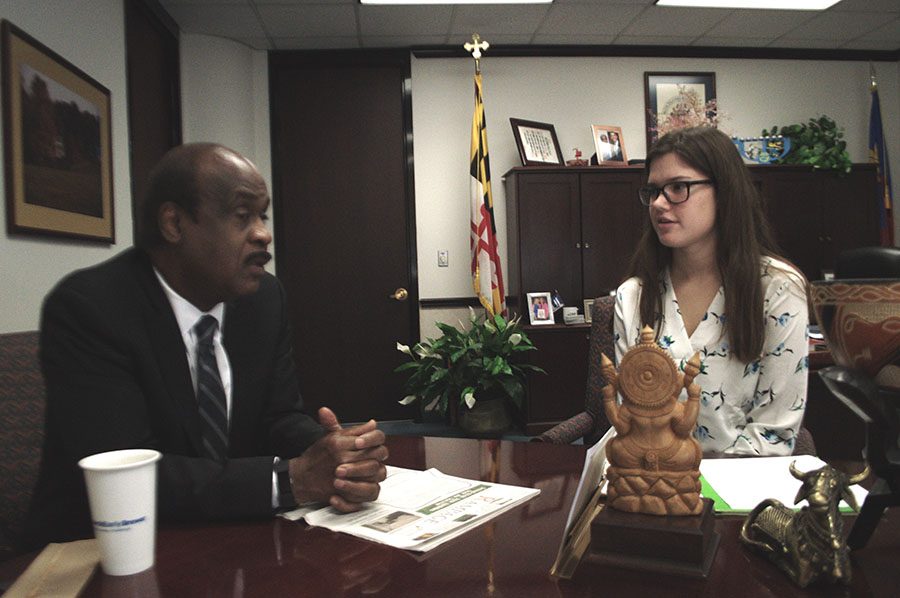Q&A: Former County Executive Ike Leggett
November 26, 2018
The Rampage sat down with Montgomery County Executive Isiah “Ike” Leggett to discuss his career in politics as county executive as he nears retirement, also touching on his past growing up in the South during the 1950s and 60s. This transcript has been edited for clarity and length.
Rampage: What has been the most rewarding part of being the county executive?
Isiah Leggett: Doing something that involves one or two people who are born beneath the social safety net, people who otherwise would be at risk, but for the government’s ability to find a solution and answer for them. It may be providing someone housing or ensuring that they get a job or benefits or something for which you can play a special role, but the impact may only be for some person or very few people. Those are the things that I get most excited about, and they seem small in comparison, but they are most meaningful for me.
R: Can you think of a specific small instance?
IL: “We had a person who had retired because of a disability recently, he had a back injury, he worked as a bus driver for about 13-14 years. When he became disabled, he was no longer able to drive and he was around 62 years old, and so he got a disability check from the county. He was not aware that the disability only went up to the point when he was 65 because social security would check in, and so unbeknownst to him, he got to 65 and all of a sudden his checks stopped. He was faced with trying to pay the mortgage and a variety of other things. I realized that in order to change this, we needed to go back to augment the collective bargaining process because he was a union member, we needed to go to our retirement board to get approval on that, we needed to go to legislation with the county council, all of these measures took several months to do, and we went through that painstakingly.
R: How do you think your past has influenced your time in Montgomery County?
IL: It has certainly shaped me and allowed me to have a broader perspective about things—I look at things somewhat differently. The small things, the things that impact people’s lives, when you’re going through the recession and facing the challenges, you think about the people who are less fortunate, the inequalities that exist, how you need to mobilize, organize, all those things come into play. And sometimes you don’t always consciously think about them, but they’re sort of ingrained on your leadership process and how you go about making decisions.
R: How does it feel to have been a part of the civil rights movement and to see the county change and having had part in that change?
IL: On one hand it is gratifying because you can’t deny that we have changed positively. Whether we have changed enough is the question that we have today. Now, this is a great country, a great county, a great state. I have been elected overwhelmingly by non-minorities for seven county-wide elections. I would not be here without the support of a broad base of non-minority voters. And so you look a that and say that is tremendous change. A kid from Louisiana, humble background, who grew up in the height of segregation and Jim Crow, to now being the county executive, not once but three successful elections. So there has been a tremendous positive change. Now, what we see today and most especially with the incidents that are occurring around the country, we see that there is still a great deal of change that needs to be made.
R: Did you feel automatically more accepted in Montgomery County than you did in the South?
IL: Yes and no. In Louisiana, in the south, racial attitudes are probably more clear and upfront. People in the south are remarkably honest about their opinions. If they don’t like something, they will tell you. Whereas in the northern parts of the states, people had just as bad attitudes or biases, but they were more subtle about it. You would find people would say one thing and then do something differently. So yes, there probably is a difference, but the differences are not as great as people perceive them to be.
R: How did you get involved in politics?
IL: I got involved initially when I was working as a student leader in the civil rights struggle. I was a part of many of the sit-ins and the demonstrations. I went off into the military and served in Vietnam and sort of set that aside for a while, but I had this passion based on the things that I had done when I was younger and I wanted to get back to it. I was able to get involved in the community working and I realized that we had never elected, at least up to ‘85-’86, no one of color to any political position in the county. We were so reluctant about success of running and maybe the negative reaction to my campaign, for a considerable period of time, there was no photograph of me.
R: For students considering entering politics, what advice do you have for them?
IL: One shouldn’t start off with the goal to be a politician. The goal should be, let me do the very best in what I am doing. In whatever field that you’re in, do the very best that you can in it and become much more engaged in the broader aspects of the community and politics will follow. You don’t start off saying I am going to be a politician; then you are in some way narrowing your focus on how effective you are going to be. You start off by just saying I am going to be a good doctor, good lawyer, a good engineer or I am going to be a good teacher or I am going to be the very best that I can in whatever I am doing, but I am also going to engage in the community so that I have an understanding of the broader issues beyond what I am doing. If you’re able to do that, then the politics of that will easily follow.





